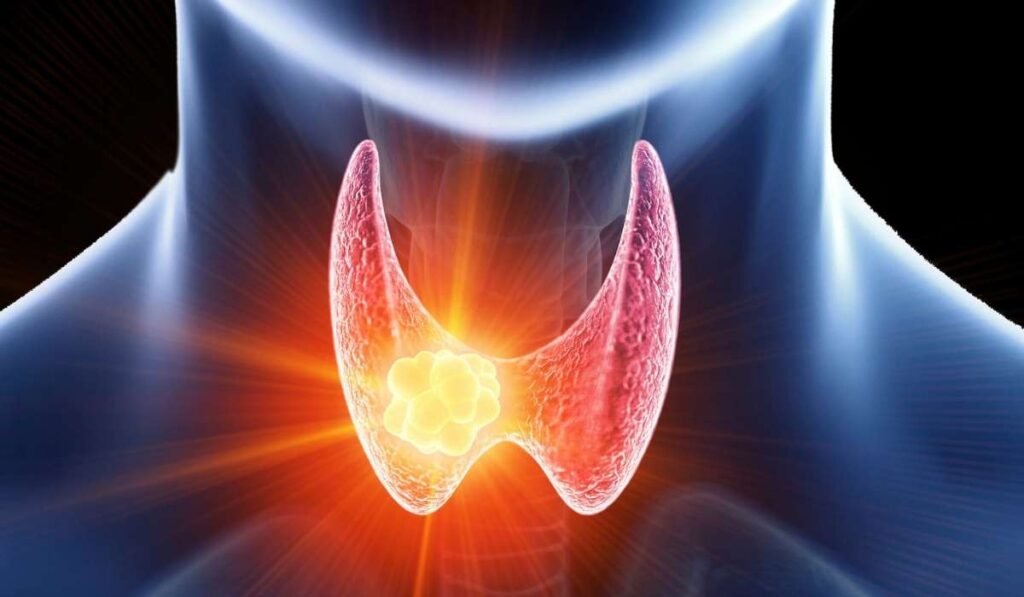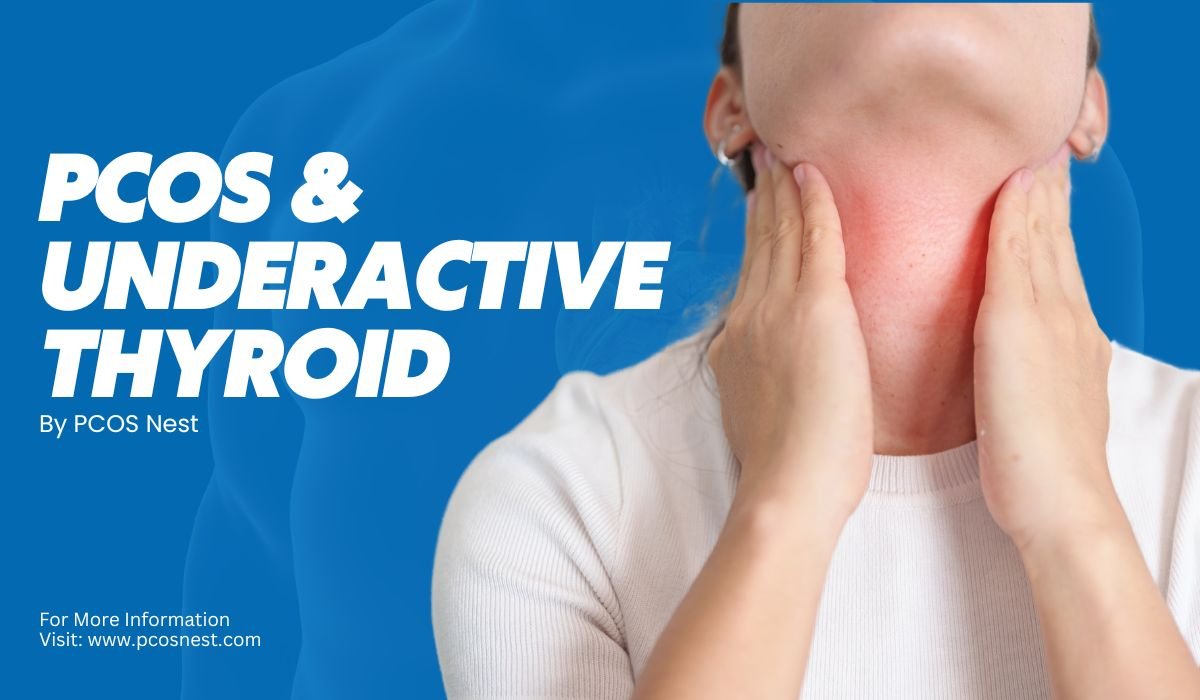PCOS and Underactive Thyroid: An Overview
PCOS (Polycystic Ovary Syndrome) is a hormonal disorder in women that causes irregular periods, excess androgen levels, and ovarian cysts. It often causes fertility problems and symptoms like acne and weight gain.
On the other hand, Underactive thyroid (Hypothyroidism) is a condition in which the thyroid gland fails to produce enough thyroid hormones (T3 and T4). These hormones regulate metabolism, energy production, and numerous body functions. Insufficient thyroid hormone levels can lead to a slowed metabolism and various physical and mental symptoms.

These two conditions frequently coexist due to shared hormonal and metabolic disturbances. When they co-exist, they can exacerbate symptoms like weight gain, infertility, and fatigue, and affect a woman’s overall health and quality of life.
This is very crucial to understand the connection between PCOS and hypothyroidism for effective diagnosis and management. Because addressing one condition often improves the other.
The Connection between PCOS and Hypothyroidism:
Both PCOS and hypothyroidism share many symptoms, including:
- Irregular periods: Hormonal imbalances can disrupt the menstrual cycle.
- Weight gain: Both conditions slow metabolism and result in weight gain.
- Fatigue: Low energy levels are common due to hormone problems.
- Hair loss: Thinning hair or bald spots can occur in both conditions.
Because these symptoms overlap, it can be hard for doctors to figure out if someone has PCOS, hypothyroidism, or both.
Hormonal Imbalances:
When the thyroid is underactive (hypothyroidism), it creates too much TSH (thyroid-stimulating hormone) and prolactin.
This disturbs the balance of other hormones like LH (luteinizing hormone) and FSH (follicle-stimulating hormone), which are needed for ovulation.
Due to this hormonal imbalance ovulation doesn’t happen, periods become irregular, and this causes infertility.
Hypothyroidism (an underactive thyroid) can also lower the levels of free testosterone in the blood. Free testosterone is testosterone that is not bound to proteins and is available for the body to use.
When hypothyroidism lowers free testosterone, it may cause low energy & muscle weakness.
Hypothyroidism is also linked to reduced levels of sex hormone-binding globulin (SHBG), a protein that carries hormones like testosterone and estrogen in the blood.
Lower SHBG means there’s less protein available to transport testosterone.
These imbalanced testosterone and SHBG levels can exacerbate PCOS symptoms, such as irregular periods, acne, and excess facial or body hair.
Metabolism & Weight:
Both PCOS and hypothyroidism are linked to insulin resistance, the condition in which the body can’t process sugar properly.
This makes it harder to lose weight and increases the risk of obesity and diseases like diabetes or heart problems.

How Common Is This Connection?
According to research around 22.5% of women with PCOS have an underactive thyroid, compared to only 8.75% of women without PCOS.
About 27% of women with PCOS have thyroid antibodies (a sign of autoimmune thyroid problems), compared to 8% in other women.
Testing for PCOS:
There are a combination of tests to diagnose PCOS.
Hormonal Tests:
A high LH-to-FSH ratio may indicate PCOS.
High levels of testosterone or DHEA-S can confirm excess androgens in the body which is the major symptom of PCOS.
Ultrasound:
Looks for polycystic ovaries, which appear as multiple small cysts on the ovaries.
Testing for Hypothyroidism:
To diagnose hypothyroidism, there are tests of thyroid hormones and related antibodies.
TSH (Thyroid-Stimulating Hormone):
High levels indicate the thyroid isn’t producing enough hormones.
T3 and T4 (Thyroid Hormones):
Low T4 or T3 confirms hypothyroidism.
Thyroid Antibodies:
Tests for antibodies like TPO (thyroid peroxidase) or TG (thyroglobulin) help detect autoimmune conditions like Hashimoto’s thyroiditis.
Herbal Remedies for PCOS and Hypothyroidism:
Spearmint tea is considered the best remedy for PCOS and helps in reducing androgen levels. Eat Low-Glycemic Index Diet and anti-inflammatory foods. Avoid processed and sugary foods.
Also Read: Foods to Avoid When Taking Metformin for PCOS
And Ashwagandha helps in improving thyroid hormone production and energy levels. In Hypothyroidism consume iodine-rich foods and avoid Goitrogens (substances that can affect the thyroid’s ability to absorb iodine) like Cabbage, broccoli, cauliflower, etc.

Frequently Asked Questions:
1. Can PCOS and hypothyroidism occur together?
Yes, these conditions often coexist. Women with PCOS are more likely to have hypothyroidism, particularly Hashimoto’s thyroiditis which is an autoimmune thyroid disorder. Research shows hypothyroidism occurs in PCOS patients at a significantly higher rate than in the general population.
2. What are the common symptoms of both PCOS and hypothyroidism?
Shared symptoms include weight gain, irregular periods, fatigue, hair loss, and infertility. These overlapping signs can make diagnosis tricky.
3. How does hypothyroidism affect PCOS?
Hypothyroidism can exacerbate PCOS symptoms by increasing insulin resistance, causing weight gain, and disturbing hormonal balance, which can impair ovulation and fertility.
4. Can hypothyroidism cause ovarian cysts?
Yes, hypothyroidism may enlarge ovaries and cause cyst formation, which mimics or worsens PCOS symptoms.
5. How to reverse insulin resistance with hypothyroidism?
Reduce refined sugars, high-glycemic foods, and carbohydrates, and prioritize non-starchy vegetables, lean proteins, and healthy fats. A balanced diet is very crucial to reverse insulin resistance with hypothyroidism.

